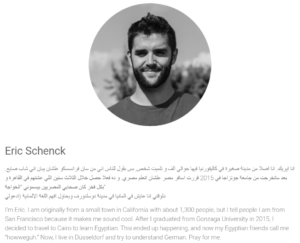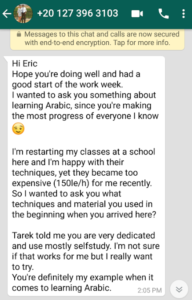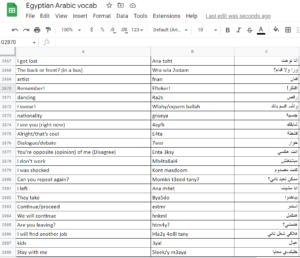So you want to learn Egyptian Arabic?
In this post, I will give you all the information you need to learn the dialect. There’s not so much good information out there, so I hope this guide helps you. I have made it as actionable as possible to help you along in your own “Egyptian Arabic” journey.
Treat this article as the ultimate guide to learning Egyptian Arabic. It’s everything I wish I would have known when I started learning the dialect. This kind of post would have saved me a ton of time (and frustration) when I first moved to Cairo in 2015.
I hope it does the same for you – no matter what your living situation or connection with the language may be.
Why You Should Listen To Me
Good question right at the beginning – why should you listen to my advice about learning Egyptian Arabic?
I don’t typically like talking about myself, but I figured I’d give you a bit of confidence before you invest your time reading this guide. So…here is a bit about me, and why you should care what I have to say.
My name is Eric and I am from the USA. I studied Standard Arabic and Political Science at Gonzaga University between 2011 and 2015. My command of Standard Arabic got so good that I ended up working as a Teacher Assistant for my university’s Arabic program my last year (hi Raj!).
After graduating, I moved to Egypt with the intention of learning Egyptian Arabic. I had the vague career goal of becoming a diplomat in the Middle East. I figured my background in Arabic along with a dialect would boost my chances.
Well, I lived in Cairo between 2015 and 2018. The result of those three years?
Well, I didn’t become a diplomat. Not even close.
I did, however, get pretty damn fluent in Egyptian Arabic. Not perfect, not “oh my God, this guy sounds exactly like an Egyptian, I can’t see any difference.” Let’s be honest about it 🙂
But here are some things that will give you an idea of my level:
- Weekly conversations with Egyptian friends over shisha discussing pretty much anything you can imagine.
- Day-to-day errands (grocery shopping, talking to my landlord, organizing things with Egyptian roommates, chatting with confused taxi drivers) performed entirely in Egyptian Arabic.
- Multiple friendships with Egyptians that happened exclusively in their language.
- Numerous foreigners asking me how I did it – and how they too could learn Egyptian Arabic fast.
By the end of my stay in Cairo, my Egyptian Arabic skills (speaking, listening, reading and writing) were formally tested at a “high B2 / low C1” level. All four areas, in other words, were lower advanced.

Ok, now with that out of the way, let’s get to the good stuff…
Why Learn Egyptian Arabic?
Many people say that the biggest trick to learning a language is to have a strong motivating factor.
I agree. Language learning takes time, and having a clear reason for doing it will keep you motivated over the long term.
With that in mind, here are some great reasons to learn Egyptian Arabic:
Egyptian Arabic is awesome.
Of course I’m biased, but Egyptian Arabic is a great language to learn. Not for any of the related benefits (see below) but also just for the sake of the language itself. It sounds pretty, has a bunch of interesting little “quirks” to it, and can quickly become an obsession for a lot of people.
You could probably make this case for any language. Still, having learned the dialect myself, I can make you this promise: Egyptian Arabic is a cool language, and a lot of fun to learn.
More useful than Standard Arabic if you want to speak with Arabic speakers.
Controversial point here, I know. Many people are completely convinced that Standard Arabic is the “lingua franca” of the Arabic-speaking world. Indeed, this is how most Standard Arabic courses market themselves (“Learn Standard Arabic, communicate with Arabic speakers everywhere!”)
I’m calling B.S. 🙁 Three things that are important to know:
- Nobody in the world speaks Standard Arabic as their native language. Literally not a single person. It’s super formal and is almost exclusively used in academia, religion, books and news broadcasts.
- Arabic speakers from different countries usually use some mix of their dialects when communicating with each other. It’s kind of a mish mash of Arabic accents. Does Standard Arabic factor into it? Sometimes, yes. But for speaking and understanding other Arabic accents, command of the Egyptian dialect (the most widely understood dialect in the world) is much more useful.
- Even if people can understand you when you use Standard Arabic, hardly anybody can naturally speak it. You might spring together a perfectly eloquent sentence that the person understands, but then their reply will come back in their dialect. Standard Arabic is just formal – almost nobody can comfortably speak it.
Ask anybody who has learned Standard Arabic and then moved to Egypt expecting to communicate with Egyptians on the streets (yours truly). They weren’t just disappointed – they were shocked.
Standard Arabic and Egyptian Arabic are two very different things.
By all means, if you want to read Arabic books, Standard Arabic is the way to. This is the Arabic that is mostly used. But if you want to speak with people? Stick with Egyptian Arabic.
Egypt is an amazing country to visit.
Obviously, learning Egyptian Arabic makes a trip to the country easier. And trust me – Egypt is most certainly a country worth visiting. Here are just a few things you can look forward to when you take a trip:
- A ton of history – both ancient and more recent.
- The pyramids. You know how sometimes you visit something that you’ve built up in your head and it’s a complete letdown? Yeah, the pyramids are the exact opposite. No matter how much you think about seeing them, it’s better in person.
- Some amazing food. Can anybody say koshary?
- Things are cheaper. Maybe I’m just a cheapskate, but all of these cool things that you can do are somehow even cooler knowing how cheap Egypt is.
I could go on. The point is, Egypt is a great country to take a visit to, and knowing the language (even just a little bit) will make your trip more fulfilling. And not even the typical “order a coffee and get a taxi” sort of thing – but really amazing experiences that you will remember for the rest of your life. No exaggeration.
I will tell you right now – some of the best travel experiences of my life have been because I learned Egyptian Arabic. Trust me on that one!
Living in Egypt will be much easier.
Similar to my last point. Knowing Egyptian Arabic makes things infinitely easier when you actually live in the country. Here’s the truth – living in Egypt can be frustrating. Here are just a few of the things you can look forward to:
- People constantly trying to overcharge you
- Language barrier with Egyptians that don’t speak your language
- Frustrating experiences trying to extend your visa
- Getting confused with unclear directions while using public transportation
Again, I could go on. Now, none of this is to persuade you against deciding to live here. I’ve said it many times before: moving to Cairo and living there for three years was one of the best decisions I have ever made. The amount of growth I went through is quite amazing.
But here’s one piece of advice I am pretty “extreme” about: if you are planning on living in Egypt (or already live there), you need to learn at least some of the language. It’s simply not an easy country to live in if you don’t know the dialect.
More cultural appreciation.
This is kind of an “all encompassing” point that could be applied to all the others, but Egyptian culture is great. And it’s a culture that you won’t be able to fully appreciate unless you learn the language.
The bowebs that guard apartment entrances. The Egyptians working as vendors in Khan al Khalili. The balance of traditional and progressive that can describe a lot of Egyptian society as a whole. All the weird, wonderful goodness that is Ramadan in Cairo.
These are all things that you simply connect with better when you know Egyptian Arabic.
Makes learning other languages easier.
This is an obvious one. If you are interested in languages, pretty much anything will seem easier after learning Egyptian Arabic. If you are a language nerd like myself, this is actually a good tidbit of info.
I’ll give you an example. In July of 2018, I moved to Germany. I had never studied German in my entire life, and moved to Dusseldord only able to say “goodbye” and a few numbers. Four months later, I passed each section of the B1 Goethe Institute test (something that takes a lot of people years).
The reason? Well, honestly, German just isn’t all that hard compared to Arabic dialects. I already had great study habits in place after three years of learning the dialect – transferring them over to an easier language pretty much guaranteed rapid progress.
(Important – this doesn’t mean that Egyptian Arabic is overly difficult, though. Keep reading the whole guide to find out why.)
The Egyptians in your life will love you forever.
Do you have a friend, a spouse, a neighbor, a coworker, or even some random person you know that happens to be Egyptian? Here’s a promise to you: learning their language will be one of the coolest things they ever see.
I have not one single time in my life spoken Egyptian Arabic to an Egyptian that wasn’t blown away by me speaking their language. This isn’t because of my skill in the dialect – it’s just because I took the time to learn it! Arabic isn’t as popular to learn as languages like Spanish or French. Even less so when it comes to dialects.
Believe me when I say that the Egyptian in your life (or the Egyptians that you meet) will be absolutely thrilled that you are taking the effort to learn the dialect. And when you see the look on their face? Absolutely priceless.
Bragging skills.
Let’s be honest: how badass would it be to be able to say that you speak Arabic?

Quite. 🙂 Enough said!
…
Pick one of these motivations from above, or make your own. (You can also check out our post on 10 reasons to learn Egyptian Arabic, while you’re at it.) Remind yourself each time you study Egyptian Arabic why you are doing it in the first place.
Got your motivation? Great.
I hope I’ve made a decent case with the points above of why learning Egyptian Arabic is worth your time. Let’s move onto the most common problems learners of Egyptian Arabic face…as well as what you can do about them.
Learning Egyptian Arabic: The Most Common Problems Learners Have + Solutions
For each problem, I will give you my take on how you can approach it to make learning Egyptian Arabic much quicker and more effective.
Problem: The script.
I don’t blame you: figuring out an entirely new script can be quite tricky. And let’s be honest: if you have no experience with Arabic, Arabic letters can be intimidating.
Still, if you don’t know so much about the Arabic script, it can be easy to overestimate how difficult it really is.
Solution: I’ve said it before, and even though some fun suckers might disagree with me (:D) I’ll say it again:
You can master the Arabic script in just a few hours of total work.
Here’s three reasons why:
- The Arabic script is, in fact, a script. It’s not characters like some Asian languages that take (literally) hundreds, if not thousands, of hours to memorize.
- There are only 28 letters. English has 26. Not that different!
- The “shape changing” of letters doesn’t happen so often. What is “shape changing”, you say? Check out this article I wrote for StoryLearning for a deep dive on the script (and why it’s actually quite easy).
Here’s an article I wrote about this exact topic. Give it a look!
Problem: The pronunciation.
Arabic sounds are likely different from anything you’ve ever had to say. This is not only difficult for your mouth to get used to, but frustrating when you keep mispronouncing words. How can you ever hope to perfect Egyptian Arabic pronunciation?
Solution: Arabic, like any language, does in fact have certain sounds that are hard to make. Still, MOST of the letters cause no problem, and have pretty much the same equivalent as sounds in English. This means most words won’t actually be so problematic.
As for the tricky letters? If you commit yourself to good pronunciation straight from the beginning (and you should) you have a pretty easy way around this: hire yourself a teacher (see the section below on “Top tips”). This will help you really pinpoint the sounds coming out of your mouth. That’s one of the only ways to ensure that you aren’t forming any bad habits.
You can also watch some videos online with Egyptians simply saying things. Focus on the individual sounds, and then repeat them. Seems weird, I know – but totally worth it if you want to be understood!
Problem: The difference between Egyptian Arabic and Standard Arabic.
Ok, this is a pretty big one. Often, before turning to a dialect, people will have spent at least a little bit of time learning Standard Arabic. They will get used to the way that Standard Arabic works, and might even get pretty good at it.
Unfortunately, learning Standard Arabic doesn’t prepare you so well for the dialect. Here are a few of the differences you will immediately notice between Standard Arabic and the Egyptian dialect.
- Pronunciation (the same letter will make a slightly different sound)
- Grammar (very strict in Standard, much looser with Egyptian Arabic)
- Vocabulary (95% different)
Enough to drive anybody crazy! The good news?
Solution: Egyptian Arabic as a whole is easier than Standard. So, if you have some experience learning Standard Arabic – the dialect should be a breath of fresh air.
Plus, as we mention throughout this guide, this is the exact reason we started Cleo Lingo: to create quality material for people that want to learn Egyptian Arabic.

So another part of the solution is also to check out the website 😉
Problem: “Franco Arabic”.
Once you’ve gotten used to the difference between Egyptian Arabic and Standard + mastered the script, you still have to deal with “Franco ArabIc.
This is a combination of Latin letters and numbers to approximate the sound that Arabic letters make. The reason for the numbers? There are some Arabic letters that you just can’t get with Latin letters.
While Franco Arabic” isn’t some official form of Arabic, millions of people use it when writing messages on apps like WhatsApp. You will also see it in many Arabic dialect instructional content (Cleo Lingo included).
I know – confusing.
Solution: Like anything else, Franco Arabic progressively gets less strange with practice, and at some point easy. Plus, there isn’t really any “master” version of words. Different Egyptians will spell the same word differently. So as long as you are getting words basically correct (and not mixing up the different numbers)
We wrote an entire guide to Franco Arabic, so be sure to check it out.
Problem: Noun plurals
Arabic plurals work differently than many other languages. In English, for example, you often just add the letter “s” to make a noun plural. This isn’t always the case (one fish, five fish), but it’s common enough to make plurals quite easy in English.
Not so in Arabic. There is more variation with Arabic plurals. This not only requires you to
The solution: Not to stress it. There are only a few different ways of formulating plurals, so only a few “formulation rules” that you have to commit to memory. Sure, there are always irregular nouns that look different, but you have those in just about any language.
Plus (shocker!) you don’t need to know every word in Egyptian Arabic. I sure don’t (how do you say “doorknobs” in Egyptian Arabic, totally forgot…), but I get by just fine!
Problem: Lack of motivation
Learning a language to a high level is hard if you don’t have consistent motivation. We all know this from just about any habit / skill we’ve wanted to develop (exercising, eating well, learning how to code, etc). So yes – if you want to learn Egyptian Arabic, you need motivation.
Unfortunately, this motivation can be pretty hard to keep. Life happens. You naturally have other obligations, other goals, other hobbies besides “Egyptian Arabic, all day every day.” This is normal – and healthy. Plus, Egyptian Arabic can take some getting used to. We don’t all have hours every day to devote to Egyptian Arabic. Totally normal.
Still, if you’re not careful, one missed day can quickly turn into two, and then a few weeks of not practicing Egyptian Arabic at all.
Solution: I mentioned in the beginning that your motivation in learning a language is essential. This is the reason you have for devoting time to learning Egyptian Arabic. This is the overall purpose you have in putting forth the effort required.
Most people’s motivation in learning Egyptian Arabic has to do with Egyptian culture. They want to understand the people more deeply, get obsessed with Egyptian. Now, maybe this is an unpopular opinion, but I think it’s totally fine to not be in love with Egyptian culture. There are many reasons people decide to learn the dialect. It’s not like you need to be some Egyptian culture expert to make great progress with the dialect.
But here’s the truth: a strong motivating factor is going to make learning Egyptian Arabic so much easier. So make sure you find at least one strong motivation for yourself!
Problem: Lack of materials
This last problem, maybe more than any of them, is one that a lot of the readers of this post can probably relate to. I sure know I can. Lack of materials isn’t so much a problem with the language, per se. Rather, it’s just a simple (yet frustrating) reality that you will have to deal with.
The fact is, any Arabic dialect is going to have less resources at your disposal than the more “popular languages” (Spanish, French, Japanese, etc,). That’s a reality you have to work with.
Solution: Get creative. Is the lack of materials frustrating? Yes. There aren’t so many things out there – but there are things out there. You just have to look for them.
Actually, this is the exact reason that Tarek and I started Cleo Lingo. I love Egyptian Arabic specifically, we both love languages generally, and I knew how frustrating it was to want to get fluent in Egyptian Arabic but to not know where to start.
That’s exactly what this guide is for! Still, if you go to our website, you can get this sweet guide to resources for free:

Anyway, let’s move on to my main tips for learning Egyptian Arabic:
Top Tips For Learning Egyptian Arabic
Now you have a good understanding of the most common problems / difficulties that people face, and more importantly, what you can do about it. This will be a collection of tips for learning Egyptian Arabic. In creating this list, I have formatted it in a way that following even just a few of them will pay dividends in your learning.
We often get a lot of questions about learning Egyptian Arabic, and many of them can basically be summarized in these two:
- I just moved to Egypt and want to learn the language – what now?
- How do I learn Egyptian Arabic if I don’t live in Egypt?
With that in mind, I have made specific advice for both groups of people. Keep in mind that there is a lot of overlap here – you will find a “for both” section at the end.
For people living in Egypt
Hire a teacher and meet with them at least once a week
The ease of finding a teacher will somewhat depend on where you live. Bigger cities like Cairo, Alexandria, or Sharm el Sheikh? Not a problem. Smaller cities might be a bit more difficult. Still, for most places you should be able to hire someone.
The great thing here is that, compared to many other countries, Egypt is super cheap. This extends to teachers as well. You can probably find a good one to meet with you a few times a week for 5-6 dollars an hour. Worth the money, I’d say!
If you’re serious about learning Egyptian Arabic, treat these meetings like any othe professional commitment. Stay consistent, do what your teacher tells you, and always come to class prepared. You’ll notice a difference even after a few weeks.
Intramural sports
I played ultimate frisbee for two years in Egypt. The number of people I met is pretty crazy, and it was easily one of the best things I did for my Egyptian Arabic.

Not the best picture of me, but you get the idea!
I know, I know: it can be weird sometimes being the foreigner that insists on speaking Egyptian Arabic. It’s such a rarity, that Egyptians will have trouble believing your skills at first. 🙂 But just let them know that you are serious about learning their language. Like I said at the very beginning, they will love you for it.
Sports is a great way to meet Egyptians, make friends, have a ton of fun, get in shape…and use the language in the process.
Go to CouchSurfing events
If you haven’t heard of CouchSurfing, it’s a pretty awesome website for finding free places to stay while you are traveling. However, itt’s also just generally great for meeting people.
Find out how CouchSurfing was my secret weapon for practicing the language in Egypt by reading this post. I hope it inspires you to do the same!
Chat with people in the streets
I haven’t told many people about this, but I had a very weird tradition while I lived in Cairo. It was called “Get Lost Friday”, and it’s exactly what it sounds like.
I would intentionally go to a part of Cairo I had never been to (it’s so big you’d never run out of new neighborhoods) and get lost. This would force me to chat with people to find my way home. Whether I was finding my way to the metro, a bus stop, or a hotspot of TukTuk activity, I was chatting with Egyptians.
This skyrocketed my ability to:
- Correctly pronounce tricky words when people corrected me
- Explain things when I was trying to make my way home
- Get comfortable making mistakes – of which there were a lot
Now, I will be the first to admit it: this approach is a bit extreme. If you are introverted, this may not be something you’re comfortable with. Also, sadly, if you are a woman, simply going around to random places in Egypt can be legitimately dangerous.
Still, my general point stands: if yo are serious about learning Egyptian Arabic, and you live in Egypt, simply speaking to people can do wonders for your language skills. Might as well take advantage of it – in a smart way, of course.
With all that in mind, here is my last piece of advice that anybody can do…
Be proactive in learning Egyptian Arabic
This is pretty standard for just about any skill you are trying to pick up. If you live in Egypt, or you’re about to move there, you have a wonderful opportunity to make the language a necessary part of your life. You have the chance to hear the language every day. You can, just by walking out of your door, use the language every day.
How cool is that? All it takes is a little proactiveness and dedication. Add in consistency, and you’d be surprised at how much sense the language starts to make.
For people not living in Egypt
Get yourself a language teacher
The same advice here I gave to the people living in Egypt: treat this with a certain amount of seriousness. That’s how you will learn the language fast.
Since you’re not living in Egypt, you will (most likely) take these classes online. There are a ton of useful websites for finding online teachers, but I really like iTalki.
Join Egyptian culture clubs or organizations
I remember there was an “Egyptian Culture Club” in the city I lived in for college. Oddly specific? Yes – but probably would have prepared me quite well for moving to Cairo. Unfortunately I only discovered this right before I left. Otherwise I’m sure I could have gotten some good “insider tips” for life in Egypt.
The point here, of course, is that the internet is your friend. Go searching for these sort of clubs or organizations if you want to learn the dialect. Not only will you probably meet Egyptians, but it will give you a deeper connection to the culture. This is fantastic for keeping your motivation high!
For both people
Subscribe to our email list
Not only will we hook you up with a couple of awesome (and free) resources, like our “Egyptian Arabic Cheat Sheet”:

And our 5,000 word guide to Egyptian Arabic resources:

But we will also send you cool stuff that helps you learn Egyptian Arabic.
This includes:
- A bi-weekly newsletter
- Updates about all the blog posts we release
- News about our first Egyptian Arabic course (coming in early 2024)
Simply go to our website to sign up for free! 🙂
Watch videos online (YouTube and Netflix)
Video content is great because it helps you practice your listening skills.
I wrote an article about the best Arabic shows on Netflix. Most of them are in Egyptian Arabic, and a lot of them have excellent subtitles – in the Egyptian dialect! Check it out here.
Same thing with YouTube. Go searching for cool channels and see what’s out there. My personal favorites are “Saturday Night Live in Arabic (yes, it’s a thing, and it’s in Egyptian Arabic!) ” and “Egyptoon.” While these are admittedly a bit advanced, you can still get a lot out of them if you follow the process below. Here are three steps I recommend:
1) Write down phrases you hear that you don’t know. If the show uses subtitles, simply write down what you read. If there aren’t any subtitles, write down the phonetic sounds with the Latin alphabet (or with the Arabic alphabet if you are good enough). Remember the context of the phrases – it’s important for the next step.
2) Take these phrases to a teacher or Egyptian speaker. They can help you translate the phrases. Remember the context in which you heard the phrases / what was happening when it was said – this will help them figure out the phrase in case you have written it down incorrectly.
3) Add the translated phrases to a vocab app. Learn them by heart – this is how Egyptian Arabic vocabulary, specifically longer conversational phrases, will start to get stuck in your head.
4) Watch the video again! This is where the magic happens. You have now learned a bunch of new phrases, and the video will make more sense each time you watch it. This was one of my big strategies to learning Egyptian Arabic – you’d be surprised how fast you can learn using this method repeatedly every week.
Wondering how exactly to go about the “vocab app” from step 3? Well, check out my next tip…
Anki
No matter how you learn Egyptian Arabic, one thing is unavoidable: you will need to memorize a bunch of vocabulary. Thankfully, there are apps that will help you.
My favorite is Anki. This is based on spaced repetition. Here’s a cool article explaining what that is, but here’s the short version of it:
- Your brain naturally forgets things over time
- The more you review things the longer the time will be before you forget it again
- When studying vocab, you want to focus your time on words and phrases that you have already forgotten / are close to forgetting, NOT ones you have already mastered
- Spaced repetition is how you do that
So, do that! Take the vocab and phrases that you are learning in books, classes, conversations with your teachers, and real life, and turn them into digital flashcards.
No joke: a few months before I left Egypt, I paid an Egyptian guy 200 dollars to take all of my handwritten vocab notes and turn them into Anki cards. Over the previous three years of learning the dialect, I had racked up….wait for it…
6,500 vocab phrases!

One small section from my massive digital collection of Egyptian Arabic vocab.
Now, instead of a massive stack of paper, I have a ton of useful vocabulary in digital form ready to be reviewed whenever I want. Best money I ever spent. 🙂
Get a Tandem partner
You’ve likely heard of this before, but let’s go over it again anyway:
- To get better at speaking a language, you have to practice speaking quite a lot
- You want to learn Egyptian Arabic
- There are Egyptians, in Egypt and online, that want to learn your language (English or otherwise)
- You can teach each other your languages for free
This is what’s known as a “Tandem partner.” Basically, you meet with an Egyptian, and you trade languages. You can find partners like this on many apps, and the most famous one is literally called “Tandem.”

There are two main benefits to this approach to speaking practice:
- It’s usually free
- You might just get a friend out of it
Still, keep this in mind: because your Tandem partner isn’t being paid to help you, there is a decent chance that they don’t take it nearly as seriously as a paid teacher would. Don’t be surprised with frequent cancellations or delays.
Follow Egyptian people on social media sites
Social media can be great because it’s a bunch of Egyptians using social media in their own language. As long as you find accounts making content in Egyptian Arabic, and not Standard, this can be a gold mine for vocabulary acquisition. Plus, you might learn a fair amount about Egyptian culture!
Now, while I have a few people I would recommend, I think it’s impotant to find your own people on these platforms. You will connect differently with different people, and only you can decide what kind of people are worth following for your Egyptian Arabic skill.
For example, I’m sure there are cool accounts to follow on TikTok, but I don’t use it. (I know, I know…once you’re 30 like I am you start to really feel old.)
Anyway, the main point is this: the internet is your friend. Either way, be sure to use these platforms actively. No use learning a bunch of Egyptian Arabic vocab if you aren’t going to turn them into vocab cards (see my tip about Anki).
Get creative
Everybody learns differently. While the above advice is solid, there are a ton of different ways you can practice and improve your Egyptian Arabic. Really just depends on how you learn, what gets you excited, and what you can realistically do consistently.
Here are just a few of the more “creative approaches” I have used to improve my Egyptian Arabic.
- Create your own Egyptian Arabic challenges. Hardcore focus on Egyptian Arabic over a short amount of time can bring incredible results. Here’s one such challenge that I attempted: a one hour iTalki lesson each day in Egyptian Arabic, 30 days in a row. This was hard, but skyrocketed my comfort with the language. Read all about it in Part One and Part Two.
- Take full advantage of your “teacher time” each week. You don’t just have to sit there and talk for an hour each time. This is the highest “ROI” time you will have learning Egyptian Arabic – use it wisely. Maybe you ask your teacher to make you your own custom vocab cards, Maybe you get them to send you a video they have watched and chat about it next time you meet. The possibilities are endless.
- Talk to yourself. I still do this with a C1 level in German. Will you make mistakes? Sure – but it’s a great way to practice using the language and repeating useful phrases.
- Talk back to the screen. This tip is kind of similar to the previous tip, with the added difficulty of needing to say phrases that are actually in context. This strategy is useful because it (kind of) mimics a real conversation, without the pressure of “real speed.” This of course assumes that you understand whatever they are saying in the video / movie!
One Last Word (You Got This :D)
The reason I started Cleo Lingo is that I love Egyptian Arabic and I know how frustrating the general lack of resources can be.
So here is one last bit of motivation: Egyptian Arabic is worth your time. I promise. 🙂
You are smart enough to learn it, and you have the ability to stay consistent in your studies. That’s really all you need.
If you ever have any questions, feel free to email us. You can also send us a message via our “live chat” button.

Learning Egyptian Arabic is one of the best, most fulfilling things I have ever done, and I wish I would have had this guide when I first started learning it.
I hope it helps you!
-Eric


Have been learning for about a year,,badly need help.
I hope Cleo Lingo can help! 🙂
just curious, what job do you have now in Germany?
I work in marketing for a language learning company actually 🙂